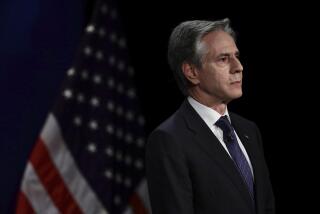EU Delays Russia Pact Over Chechnya
- Share via
BRUSSELS — A hesitant but increasingly worried Western Europe took its first substantive action against Russia on Thursday to register disapproval of Moscow’s efforts to crush resistance in breakaway Chechnya.
Speaking to a committee of the European Parliament here, Hans van den Broek, foreign affairs commissioner of the European Union, announced that the EU would delay implementing an important partnership agreement with Moscow that would open the prospect of an eventual Russia-EU free-trade agreement, improve the investment climate in Russia for EU-based private companies and establish regular political dialogue between Moscow and Brussels.
Russian President Boris N. Yeltsin traveled to the Greek island of Corfu last June to sign the accord at an EU summit. Union officials at the time said they planned to implement the provisions as soon as possible.
On Thursday, however, Van den Broek said the agreement would be shelved pending consultations with the union’s 15 member states. “It’s a signal that cannot be misunderstood,” Van den Broek declared. “We don’t dispute that Chechnya is part of the Russian Federation, but we do have serious concern--verging on indignation--at the way a political problem is being addressed by military means.”
Although a comparatively minor step, the move marks an escalation in the so-far cautious reaction of Europe’s democracies to the Chechen crisis. Following an initial period of inaction motivated mainly by worries that any sharp condemnation of Yeltsin might make matters worse, Europeans have begun some gentle diplomatic prodding.
As Van den Broek made his statement here, the Moscow-based ambassadors of France, Germany and Spain, acting on behalf of all 15 EU countries, lodged their second request in less than a week for an explanation of Russian activities in Chechnya.
Another European troika, consisting of the ambassadors of Italy, Switzerland and Hungary and representing the 53-nation Organization for Security and Cooperation in Europe (OSCE), also paid a call on the Russian Foreign Ministry in Moscow on Thursday in hopes of getting a clearer picture of Russian intentions in the conflict.
German Foreign Minister Klaus Kinkel earlier this week called on Moscow to invite an OSCE delegation to Chechnya to search for a political solution to the conflict, and on Thursday British officials backed this idea.
Moscow’s approval for such a mission seems unlikely, however.
In Vienna, OSCE spokeswoman Melissa Fleming said the organization legally could decide to dispatch a team of observers to the conflict zone even if Russia objected, although she admitted that in practical terms, Moscow could easily block that move by refusing to issue visas.
As diplomatic activity increased, the level of rhetoric also intensified.
German Chancellor Helmut Kohl, who professes a strong personal friendship with Yeltsin, issued a statement Thursday demanding that “the Russian leadership and the Russian Parliament” agree on a solution with the Chechen resistance. And French European Affairs Minister Alain Lamassoure said, “Russia must know that the bombing of civilians with aircraft and hundreds of tanks is not a concept included in the European democratic model.”
More to Read
Sign up for Essential California
The most important California stories and recommendations in your inbox every morning.
You may occasionally receive promotional content from the Los Angeles Times.













